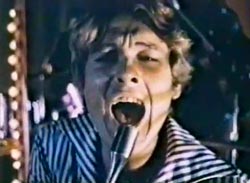research
Youth Won't Be Served
- by Karl Greenberg , July 18, 2012
 The ’70s-era motion picture
"Wild in the Streets" was prescient, despite its darkly absurd vision about a 20-something pop icon who gets elected President. He ends up creating a kind of hippie Khmer Rouge in which everyone over
30 is marginalized. Then he makes it everyone over 20, then everyone over 15.
The ’70s-era motion picture
"Wild in the Streets" was prescient, despite its darkly absurd vision about a 20-something pop icon who gets elected President. He ends up creating a kind of hippie Khmer Rouge in which everyone over
30 is marginalized. Then he makes it everyone over 20, then everyone over 15.
That cinematic vision may have reflected a ’60s-era rebelliousness as much as anything, but its theme has played out over the past 30-plus years through peoples' obsession with youth, fear of aging, and a desire to stay young by any means necessary -- including the surgically macabre.
But with the burgeoning global population of older people, are changes afoot? A new study by Euro RSCG says people are tired of having to act and look younger than they are and live up to some sort of unattainable youth ideal.
advertisement
advertisement
From an online survey of 7,213 adults in 19 countries, the firm found that three-quarters believe society has grown much too youth-obsessed. And respondents said they are tired of the unrelenting content that apotheosizes youth, and of the pressure to live up to a cultish neo-Hellenic body-beautiful ideal.
Just about three-quarters of those who surveyed expressed the belief that society has grown much too youth-obsessed -- an opinion shared not just by the older set but also by 6 in 10 Millennials. Seventy-seven percent said they intend to age gracefully, compared with only 23% who intend to fight aging every step of the way.
It's probably not a good idea for marketers to ignore this shift; Euro RSCG points out that about 6.9% of the world’s population is age 65 or older, and that percentage is growing. While Brazil and Argentina are infamous for having incredibly high rates of cosmetic surgery, another movie, aptly named "Brazil," offers a take on the horrors of the "youthist" endgame: one elderly woman in search of youthful beauty is literally reduced to a soup by botched efforts.
Maybe that film, albeit one shot in the ‘80s, reflects a growing cynicism. Indeed, of 20 aging-related concerns presented as part of the survey, becoming physically unattractive was second to last on the list. Only 19% of respondents had any worries about losing their looks. And just 1 in 5 have had or would consider surgical enhancements to look younger. Vanity is the driver for cosmetic surgery, and 52% cite on-the-job age discrimination, as a reason that people are so desperate to hide/retard signs of age.
The firm says that while nearly 6 in 10 say they feel younger than their age and over half are also confident they look younger than most of their peers, about two-thirds of those ages 55 and older said they won’t just accept aging, but will actually “embrace it and all that comes with it.”
The biggest concerns about aging are practical: two-thirds are worried about diminished physical and cognitive capacity; More than 6 in 10 are worried about running out of money; and 59% fear they won’t be able to afford adequate medical care. But fewer than 40% worry about death and dying. And that decreases with age.
And when asked if they'd take a pill that would guarantee they’d live to age 100 but without any certainties regarding their physical or mental state, only 28% said they’d swallow it, while 72% would flush it. Four in 10 said they’d rather not live into their late ’90s, preferring to die younger, when they’re less frail and more independent.
What does this mean for marketers? The firm says aging consumer populations will mean an opportunity for those offering products and services intended to minimize physical and cognitive declines, maximize self-sufficiency and mobility, and make the retirement years safer and more satisfying.




